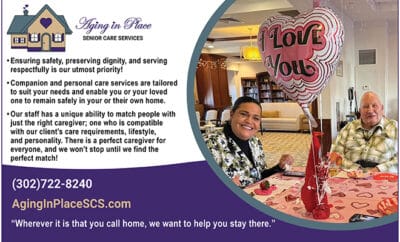Seniors & Seasonal Affective Disorder
 By Kristin Stetler Donovan, Owner, Age Advantage of Newark
By Kristin Stetler Donovan, Owner, Age Advantage of Newark
Think about what the fall and winter months bring: vibrant colors as the leaves change; the excitement of the holidays; time spent with friends and loved ones. For some, though, this time of year brings something else, depression, SAD (Seasonal Affective Disorder) is a mood disorder characterized by depression that occurs at the same time every year; and it has the ability to affect one’s everyday ability to function. More important, it doesn’t discriminate based on age. What that means for seniors, who may be already facing emotional or mental distress from a variety of factors, is that it’s even more critical for their caregivers and loved ones to watch for the signs of depression during this time of year.
The causes of seasonal affective disorder remain unknown, but theories suggest that serotonin and melatonin levels may play a role, especially as the decrease in sunlight in the fall and winter months disrupt the body’s internal clock. For seniors the increased frustration associated with limited mobility, changes in schedule, effects of medications, and even family history of depression are all factors that must be considered as potential influencers of your loved one’s susceptibility. Those affected by SAD during the fall and winter months may experience increased appetite (for carbohydrates in particular), weight gain, oversleeping and low energy levels.
The question is, how do you know if your loved one may be suffering from depression/SAD? Most of you aren’t trained mental health professionals, but using the answers to these questions is a good way to determine if you should seek the help of a professional for the senior under your care:
- Do you feel depressed most of the day, nearly every day?
- Do you have low energy levels?
- Have you lost interest in activities you once enjoyed?
- Are you experiencing sleep difficulties?
- Are there changes in your appetite or weight?
- Do you feel sluggish or agitated?
- Do you have difficulty concentrating?
- Do you feel hopeless, worthless or guilty?
- Do you have frequent thoughts of death or suicide?
It is important to consider that SAD occurs more frequently in women than in men and, generally, in younger individuals more so than older adults. But that doesn’t mean you should ignore the possibility just because your loved one doesn’t meet those criteria. Recognizing depression, seasonal or otherwise, is critical because early diagnosis can minimize the compounding effects on an already susceptible population. The accompanying potential for social withdrawal, substance abuse, anxiety, eating disorders, and even suicidal thoughts or behaviors are all conditions that can exacerbate issues some seniors already experience.
As caregivers, it’s critical for us to be vigilant for changes in our loved ones’ physical, mental and emotional dispositions. During the cold winter months especially, it is important that we support our loved ones by increasing frequency of visits, encouraging outings, and engaging in activities that stimulate brain activity.
Please know that Age Advantage is available to help you keep your loved ones engaged and to assist in any way that we can to limit the impact of the “winter blues,” whether temporary or medically diagnosed. Feel free to contact us if you feel that a loved one could benefit from our companion services. Please call 302-722-8240 if you have any questions or would like to schedule an in-home consultation.
“Thanks so much for your help staying ahead of the proverbial curve. Stuff happens and you guys always respond. What a great team of aides you guys have access to: highly qualified and very professional and a pleasure to work with. Keep up the great work. We look forward to future and continuing aide service with you.” ~ C.G.





